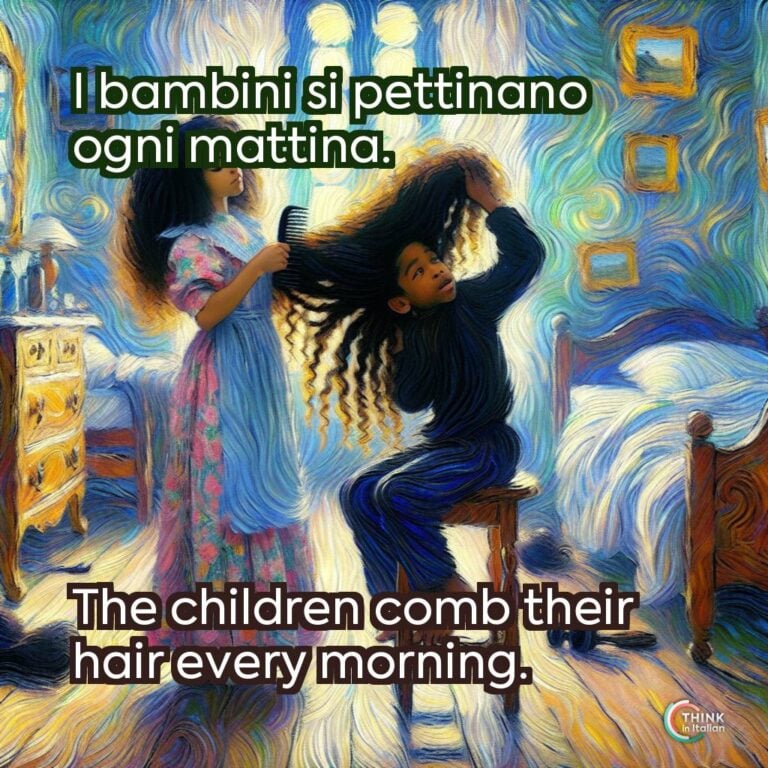What are Reflexive Verbs?
Reflexive verbs, or verbi riflessivi in Italian, are a special type of transitive verbs where the subject and the object coincide.
Look at the following pair of sentences:
- Transitive non-reflexive verb:
Io lavo il mio cane.
I wash my dog.
Io is the subject, lavo is the verb, and il mio cane is the direct object of the sentence: in fact, the verb is a transitive verb and therefore the object is directly linked to it without the use of any preposition.
- Reflexive verb:
Io mi lavo.
I wash myself.
Io is the subject as above, lavo is the verb, but here mi is a reflexive pronoun that stands for “me stesso/a” (myself). This object is still a direct object, because the verb is still a transitive verb, but in this case it coincides with the subject.
Since we are dealing with pronouns, remember the rules that Italian pronouns must follow:
- They precede the verb when the verb is:
- A finite verb, that is, a verb that displays tense, person, and number (present, past, future etc…)
- Formal imperative, that is, the imperative form with the formal “lei”.
- They follow the verb when the verb is:
- A non-finite verb, that is, a verb that displays no tense, no person, no number (gerund, participle; infinitive is pretty flexible, so you can find both!)
- Informal imperative, that is, the imperative form with the informal “tu”
Therefore, in this example the reflexive verb is preceded by the reflexive pronoun. However, since it coincides with the subject, it is the same as if saying:
Io mi lavo = Io lavo me stesso/a.
I wash myself.
Some verbs behave like reflexive verbs, but technically they’re not reflexive. They’re called false reflexive verbs.
Italian Reflexive Verbs
Conjugation
Here’s the conjugation of the presente and passato prossimo of some of the most used reflexive verbs in Italian:
Presente:
| Vestirsi (dress up) | Truccarsi (put makeup on) | Svegliarsi (wake up) | Alzarsi (get up) | Prepararsi (get ready) | Addormentarsi (fall asleep) | Lavarsi (wash) | |
|---|---|---|---|---|---|---|---|
| Io | mi vesto | mi trucco | mi sveglio | mi alzo | mi preparo | mi addormento | mi lavo |
| Tu | ti vesti | ti trucchi | ti svegli | ti alzi | ti prepari | ti addormenti | ti lavi |
| Lui/Lei | si veste | si trucca | si sveglia | si alza | si prepara | si addormenta | si lava |
| Noi | ci vestiamo | ci trucchiamo | ci svegliamo | ci alziamo | ci prepariamo | ci addormentiamo | ci laviamo |
| Voi | vi vestite | vi truccate | vi svegliate | vi alzate | vi preparate | vi addormentate | vi lavate |
| Loro | si vestono | si truccano | si svegliano | si alzano | si preparano | si addormentano | si lavano |
Passato prossimo:
| Vestirsi (dress up) | Truccarsi (put makeup on) | Svegliarsi (wake up) | Alzarsi (get up) | Prepararsi (get ready) | Addormentarsi (fall asleep) | Lavarsi (wash) | |
|---|---|---|---|---|---|---|---|
| Io | mi sono vestito/a | mi sono truccato/a | mi sono svegliato/a | mi sono alzato/a | mi sono preparato/a | mi sono addormentato/a | mi sono lavato/a |
| Tu | ti sei vestito/a | ti sei truccato/a | ti sei svegliato/a | ti sei alzato/a | ti sei preparato/a | ti sei addormentato/a | ti sei lavato/a |
| Lui/Lei | si è vestito/a | si è truccato/a | si è svegliato/a | si è alzato/a | si è preparato/a | si è addormentato/a | si è lavato/a |
| Noi | ci siamo vestiti/e | ci siamo truccati/e | ci siamo svegliati/e | ci siamo alzati/e | ci siamo preparati/e | ci siamo addormentati/e | ci siamo lavati/e |
| Voi | vi siete vestiti/e | vi siete truccati/e | vi siete svegliati/e | vi siete alzati/e | vi siete preparati/e | vi siete addormentati/e | vi siete lavati/e |
| Loro | si sono vestiti/e | si sono truccati/e | si sono svegliati/e | si sono alzati/e | si sono preparati/e | si sono addormentati/e | si sono lavati/e |
I chose these two verb tenses specifically because I wanted to show you the grammatical behavior of the reflexive pronouns and the past participle. At this point of your Italian language knowledge, I am sure you perfectly know what happens here, but it is always good to remind it.
To practice, read some more examples and try to find the reflexive pronoun!
Mi sveglio presto per andare in palestra.
I wake (myself) up early to go to the gym.
Ieri Carla si è alzata alle 10.
Yesterday Carla got up at 10.
Gli atleti si cambiano negli spogliatoi.
The athletes get changed in the locker rooms.
Oggi ti sei vestito proprio male.
Today you really dressed badly.
Lavati sempre le mani prima di mangiare.
Always wash your hands before eating.
What to Remember About Italian Reflexive Verbs
Here is a list of some things to remember when dealing with reflexive verbs:
- All reflexive verbs are transitive verbs, but not all transitive verbs can be reflexive.
- In compound tenses, reflexive verbs always select the auxiliary verb essere (to be) and the past participle agrees in gender and number with the subject.
Mi sono lavata.
I washed myself.
- When the verb is conjugated, the reflexive pronoun precedes the verb.
Mi vesto.
I dress myself.
Lui si lava.
He washes himself.
- When it is not conjugated, the reflexive pronoun follows the verb.
Mi piace vestirmi elegante.
I like dressing up (myself) elegantly.
Now you have all the tools to perfectly master Italian reflexive verbs. Practice their use in your daily conversations, and get ready to describe your day with these verbs!




